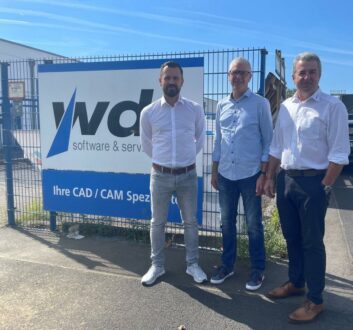
Automation, yes! But what?
In this article, we present three administrative processes that are particularly suitable for RPA.
1. invoice processing and accounting
The manual processing of invoices is a classic administrative process that is often associated with a high risk of errors and a considerable amount of time. Many companies enter invoices in paper form or as digital documents manually in their ERP system, check them manually and authorise them for payment. This is not only inefficient, but also harbours the risk of typing errors and delays in payment processing – especially with high invoice volumes.
How can RPA help?
- Automatic capture and extraction of invoice data using OCR technology
- Comparison with orders and payment terms in ERP systems
- Automatic forwarding and reminder for approval and subsequent payment instruction
- Real-time reporting for better control over financial obligations
Automating this process not only saves time, but also reduces the employee’s work to the essentials. In addition, improving the process also increases transparency and makes it clearer which payments are still outstanding. Real-time reporting, which is only made possible by optimising the process, also ensures continuous monitoring of financial obligations, allowing bottlenecks and liquidity problems to be identified at an early stage.
2. Onboarding new employees
Onboarding new employees involves numerous administrative tasks that often have to be carried out by different departments. Typical tasks include creating user accounts, assigning access rights, setting up IT equipment and providing company information and training materials. This often fragmented process can lead to delays and uncertainty, making it unnecessarily difficult for new employees to get started.
How can RPA help?
- Automatic creation of user accounts and assignment of access rights
- Sending welcome emails and providing onboarding documents
- Automatic reminders to superiors for outstanding tasks
- Tracking of the entire onboarding process for better control
This automation ensures that new employees are integrated quickly and smoothly – which not only leads to a faster increase in productivity, but also has a positive impact on employee satisfaction and loyalty.
3. Ordering and procurement processes
Companies regularly need to procure materials, services or IT equipment. These processes are often based on manual authorisation and ordering procedures, which leads to delays and inefficient use of resources.
The procurement of materials, services and IT equipment is a central component of administrative processes in many companies. These processes are often based on manual authorisation and ordering procedures, which can lead to unnecessary delays, errors in data entry and non-transparent processes.
How can RPA help?
- Automatic creation of purchase requisitions based on predefined criteria such as minimum stock levels or regular requirements
- Comparison of supplier invoices with purchase orders and goods receipts
- Digital approval processes to speed up decisions
- Integration with ERP systems for end-to-end process automation
By automating the procurement process, companies can not only save costs, but also manage their supply chains more efficiently and avoid bottlenecks.
Conclusion
In conclusion, it can be said that the automation of administrative processes with RPA offers considerable advantages – from the reduction of manual errors and the acceleration of processes to the improvement of data quality and transparency. Companies that invest in such solutions can quickly achieve significant increases in efficiency and focus their resources on strategic tasks. The targeted use of RPA in the areas of invoice processing, onboarding and procurement not only optimises day-to-day operations, but also creates a solid basis for sustainable digital transformation.
noventum consulting supports its customers in all aspects of digitization and has extensive experience in the RPA environment in particular.
noventum RPA Strategie
noventum Prozessautomatisierung
noventum IT & Management Consulting
noventum consulting GmbH is an international IT management consultancy.
Founded in 1996 in Münster, today noventum is represented in Münster and Düsseldorf with more than 120 employees. An independent noventum partner company works in Luxembourg.
The managing partner is Uwe Rotermund.
noventum consulting supports its customers in their IT challenges and in their efforts for a modern corporate culture.
Customers are DAX companies as well as medium-sized companies and organizations with a large IT infrastructure.
noventum consulting GmbH
Münsterstraße 111
48155 Münster
Telefon: +49 (2506) 9302-0
Telefax: +49 (2506) 9302-23
http://www.noventum.de
Redaktion/Presse
Telefon: +49 (2506) 9302-0
E-Mail: matthias.rensing@noventum.de
Unit Manager
Telefon: +49 2506 93020
E-Mail: tom.stroedter@noventum.de
Consultant
![]()




